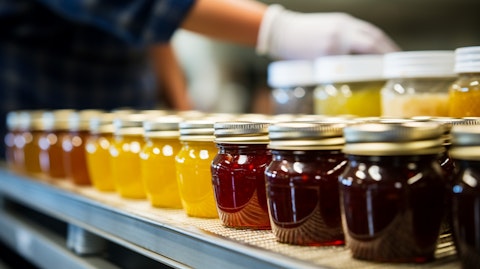We recently published a list of 12 Undervalued Defensive Stocks for 2025. In this article, we are going to take a look at where The Kraft Heinz Company (NASDAQ:KHC) stands against other undervalued defensive stocks for 2025.
Overview of Consumer Defensive Stocks
The consumer defensive sector covers products that everyone needs almost every day. These stocks are able to sustain any economic environment, even economic slowdowns, as they are not highly dependent on the economic cycle. This differentiates them from cyclical stocks, as consumer defensive stocks can produce stable profits through the various stages of an economic cycle. These stocks can thus protect your portfolio in times of economic instability, as they generally produce reliable income from dividends. While consumer defensive stocks tend not to be susceptible to market instability, they also experience less growth during positive market cycles as compared to cyclical or higher-risk stocks. Some of the most common and pure-play industry groups considered defensive include healthcare, consumer staples, infrastructure, utilities, and others.
We recently published an article on the 10 Best Soaps and Cleaning Materials Stocks to Invest In and discussed what the consumer staples sector might look like in 2025. Here is an excerpt from the article:
On December 10, Ben Shuleva, Fidelity Sector Portfolio Manager, published a report on Fidelity Investments to discuss the outlook and expected nature of consumer staples in 2025. The consumer staples sector had a positive year in 2024. Shuleva is of the view that with sector dynamics returning to normal, 2025 is also expected to have a positive outlook for the sector. Solid consumer balance sheets, a strong economy, and support from the Fed may help the sector perform better than the broader market. Opportunities thus exist in consumer staples in 2025. Stable consumer demand, steady real wage growth, and healthy employment are further expected to support these opportunities.
However, Shuleva warned that some uncertainties may affect the sector. These include trade policy changes that may arise due to Trump’s incoming presidential administration, the effects of tariffs, and the potential consequences of the dollar’s strength or weakness. He further highlighted that since most consumer staple products are manufactured in the United States, the direct effects of tariffs are expected to be limited. However, products like Mexican alcohol and Chinese items sold by consumer staples retailers may experience price increases.
Shuleva also presented a bright side to the sector, reasoning that since consumer staple businesses have experienced volatility from changing tariff policies in recent years, they are likely to be well-prepared for them. Like other sectors, the consumer staples sector’s ultimate performance depends upon the broader economy’s performance. It is a defensive sector, and defensive sectors are historically likely to perform well in economic weaknesses.
On January 6, Kevin Mahn, President and CIO at Hennion & Walsh Asset Management, appeared on CNBC to discuss the current market momentum and shed light on his view about the consumer staples sector. He corroborated Shuleva’s claim that consumer staples as a sector didn’t have a positive 2024 and lagged behind in the market. The technology space, in contrast, had much bigger gains.
However, he believed that the staples space is a very defensive sector, and it has opportunities in 2025. Viewing historical trends, the consumer staple sector has, over the past 10-15 years, traded at 1 to ½ turns over the S&P 500 multiple. Now, it is trading essentially over one standard deviation below its historical average. Therefore, some stocks in the sector have the potential to outperform.
Could Tariffs Be a Cause of Concern in 2025?
However, tariffs are expected to be a significant concern for retailers in 2025. On January 17, Yahoo! Finance’s Senior Reporter Brooke DiPalma appeared on Catalysts to discuss the impact of tariffs on retailers. She said that while several retailers are adopting a “wait and see” approach, experts have warned that consumer prices could hike within three to six months if tariffs take effect. These price increases are likely to affect discount chain retailers the most, which are usually a part of the consumer defensive sector. This is primarily due to their strategizing with production shifts and price mitigation efforts.
Our Methodology
We sifted through stock screeners, online rankings, and ETFs to compile a list of 40 undervalued defensive stocks with forward P/E ratios less than 15 as of January 17, 2025. We then selected the top 12 stocks most popular among elite hedge funds. We sourced hedge fund data from Insider Monkey’s database. The stocks are sorted in ascending order of the number of hedge fund holders that have stakes in them as of fiscal Q3 2024.
Why do we care about what hedge funds do? The reason is simple: our research has shown that we can outperform the market by imitating the top stock picks of the best hedge funds. Our quarterly newsletter’s strategy selects 14 small-cap and large-cap stocks every quarter and has returned 275% since May 2014, beating its benchmark by 150 percentage points (see more details here).

A closeup of an assembly line worker inspecting a newly produced jar of condiments and sauces.
The Kraft Heinz Company (NASDAQ:KHC)
Forward P/E: 9.74
Number of Hedge Fund Holders: 38
The Kraft Heinz Company (NASDAQ:KHC) manufactures and distributes food and beverages worldwide. Its offerings include cheese and dairy products, meals, tomato products, condiments, meats, sauces, refreshment beverages, and more. Its geographical segments of operation include North America and International Developed Markets.
One of the primary reasons analysts are bullish on The Kraft Heinz Company (NASDAQ:KHC) is its solid 5.3% dividend yield. This rate is well above its industry group average of around 4%. This positions the company as an attractive opportunity.
Despite a rise in budget-conscious consumers, The Kraft Heinz Company (NASDAQ:KHC) is generating financial efficiencies to support profitability margins. Its fiscal Q3 2024 adjusted earnings per share (EPS) grew by 4.2%, reflecting stability. Furthermore, the changing consumer spending dynamics due to a robust economy and interest rate cuts by the Fed are expected to positively affect the company’s operations. It is supporting these trends by focusing on executing its strategic pillars to generate strong cash flow and drive profitable growth.
In addition, Warren Buffett, through Berkshire Hathaway, is the largest shareholder of The Kraft Heinz Company (NASDAQ:KHC), holding 326 million shares. This translates to around 27% of the entire company and reflects confidence in its long-term outlook.
Mairs & Power Growth Fund stated the following regarding The Kraft Heinz Company (NASDAQ:KHC) in its Q3 2024 investor letter:
“We added The Kraft Heinz Company (NASDAQ:KHC) to the Fund in the quarter. Kraft Heinz is a leading global food company that possesses a portfolio of iconic brands, including its eponymous ketchup brand. The company has undergone an operational transformation focused on driving efficiency gains in supply chain, manufacturing and distribution. These efficiency gains have fueled increased investments in technology, automation, innovation and marketing, which should ultimately drive more consistent organic revenue growth and high single digit earnings per share growth. We expect above-average long-term returns, buoyed by consistent free cash flow generation, opportunistic share repurchases and an attractive 4-5% dividend yield. A modest current valuation affords an ample margin of safety.”
Overall, KHC ranks 7th on our list of undervalued defensive stocks for 2025. While we acknowledge the potential of undervalued defensive stocks, our conviction lies in the belief that AI stocks hold greater promise for delivering higher returns and doing so within a shorter time frame. If you are looking for an AI stock that is more promising than KHC but that trades at less than 5 times its earnings, check out our report about the cheapest AI stock.
READ NEXT: 20 Best AI Stocks To Buy Now and Complete List of 59 AI Companies Under $2 Billion in Market Cap
Disclosure: None. This article is originally published at Insider Monkey.





